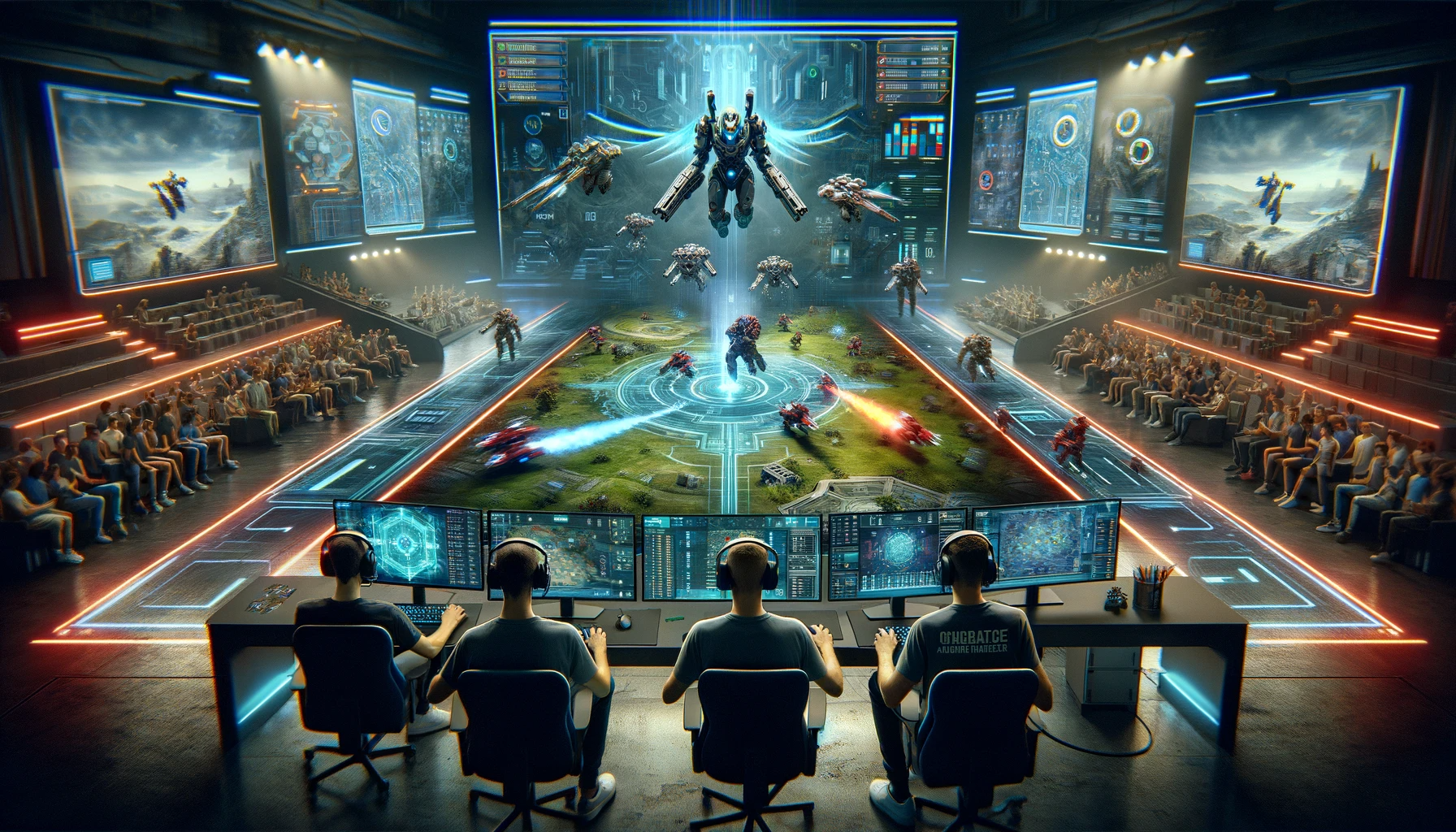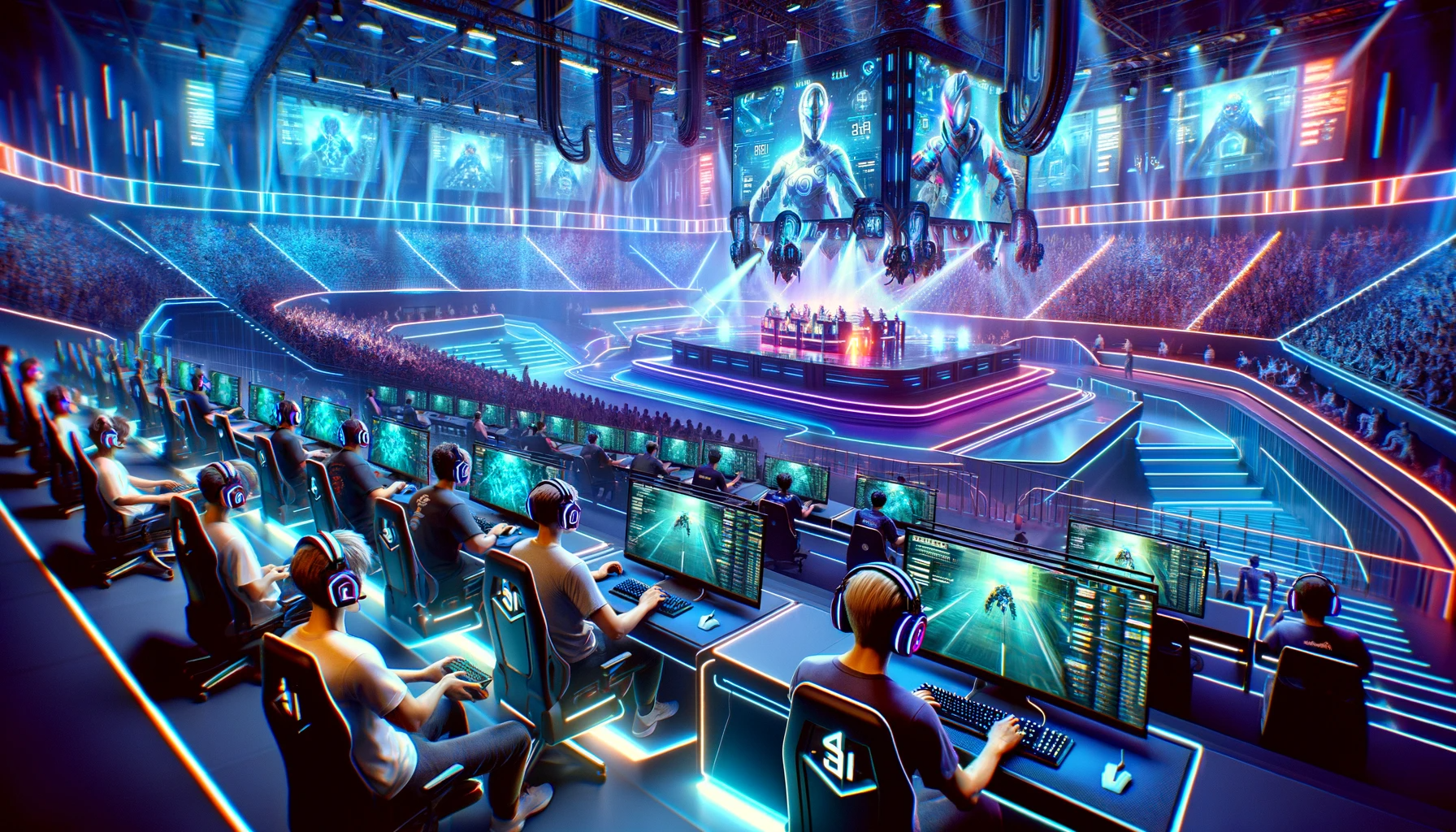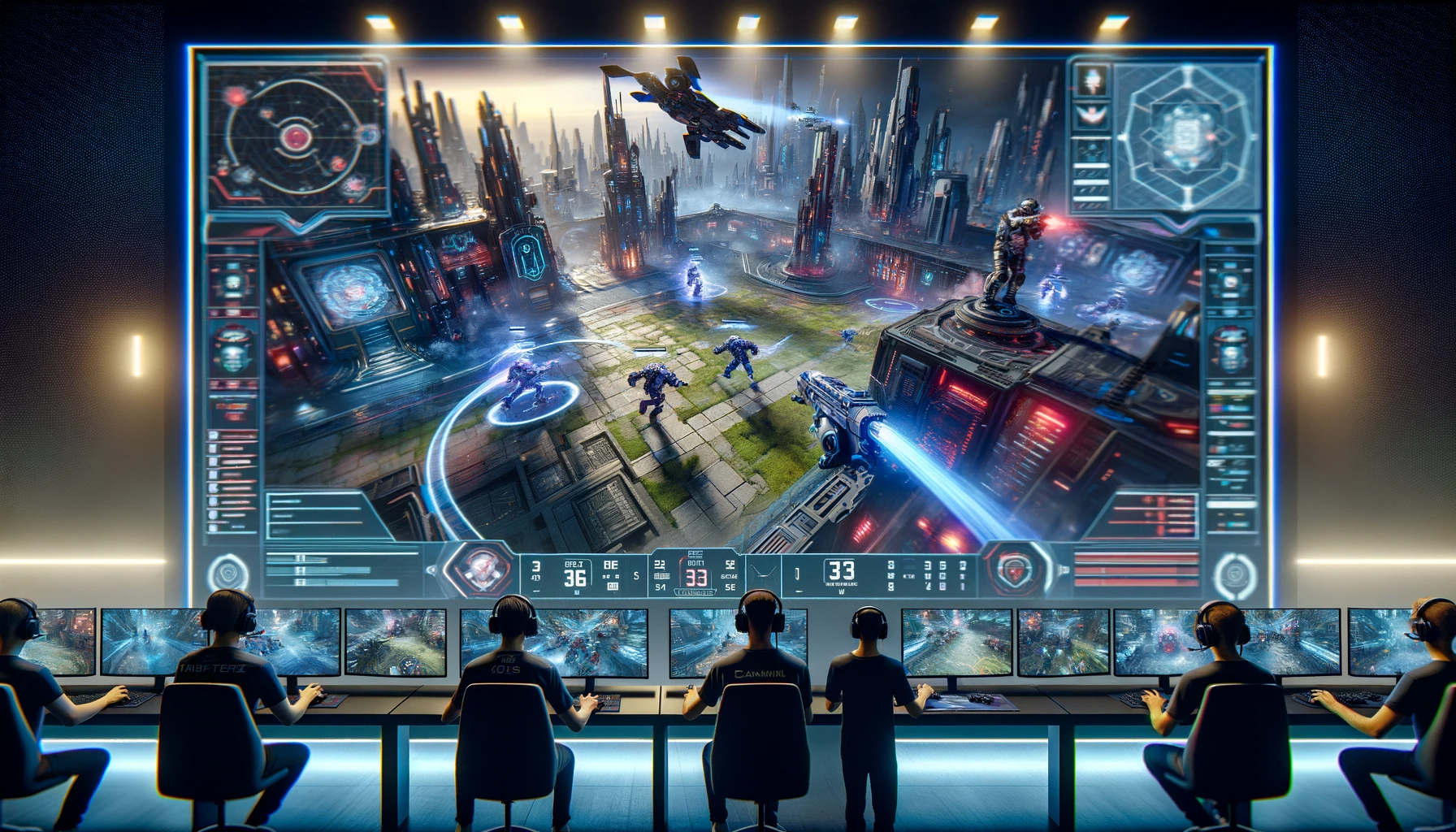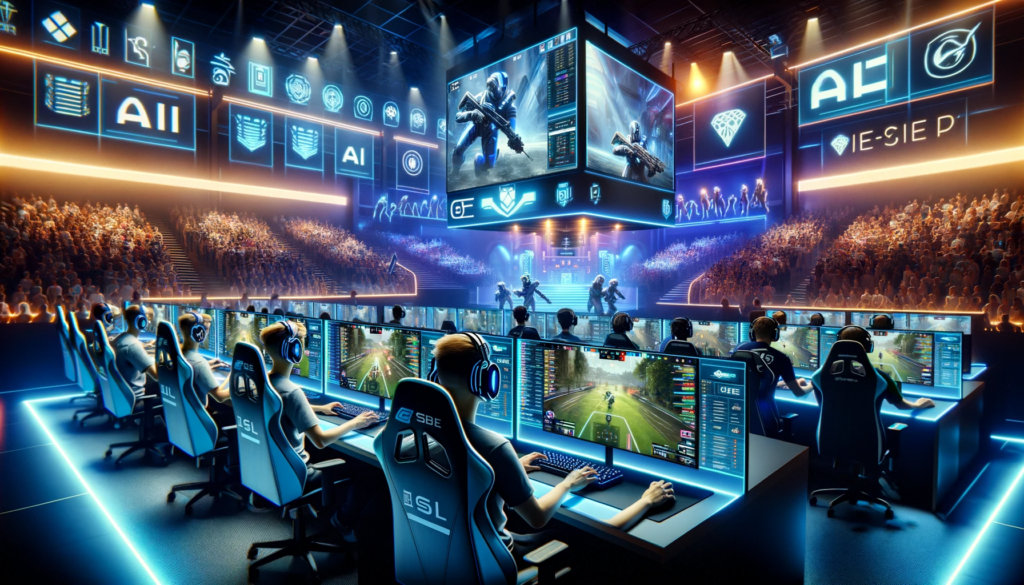Introduction
Esports, the competitive world of electronic sports, has undergone a remarkable transformation over the past decade. Once considered a niche hobby, it has now emerged as a global phenomenon, captivating millions of enthusiasts and spectators worldwide. This rapid ascent is not merely a testament to the passion of gamers but is also intrinsically tied to the role of technology and innovation in the world of esports.
In the heart of this gaming renaissance lies a pivotal force that has reshaped the way esports are played, analyzed, and experienced: Artificial Intelligence (AI). As the esports industry continues to flourish, AI is revolutionizing every facet of the game, from enhancing player performance analysis to optimizing strategies, and even elevating the overall gaming experience.
This article delves into the intersection of AI and esports, exploring the myriad ways in which AI is leaving an indelible mark on this digital battlefield. It poses a central question that underpins our journey through this technological revolution: How is AI transforming esports, from its humble origins to the grand stages of global tournaments? Join us as we navigate through the dynamic world of AI-powered esports and uncover the innovations that are reshaping the competitive gaming landscape.

The Rise of Esports and Technology
The ascent of esports from basement tournaments to packed arenas and international competitions has been nothing short of meteoric. Esports, short for electronic sports, has transformed into a multi-billion-dollar industry, attracting players, fans, and investors alike. This section explores the evolution of esports, tracing its humble beginnings to the grand spectacle it is today.
A pivotal driver of esports’ growth has been the relentless march of technology. As games transitioned from pixelated screens to immersive, high-definition experiences, so did the competitive scene. The rise of powerful gaming PCs, high-speed internet, and streaming platforms enabled players to showcase their skills to a global audience. Esports is no longer confined to the confines of arcades; it’s a digital phenomenon accessible to anyone with a gaming device and an internet connection.
In this digital realm, data reigns supreme. Players and teams hunger for insights, and this demand for data-driven strategies has created a fertile ground for AI to thrive. AI systems can process vast datasets, crunching in-game statistics, player behavior, and team dynamics to provide invaluable insights that can mean the difference between victory and defeat. Esports’ embrace of AI-driven analytics has redefined how players hone their skills and strategize for matches, marking a turning point in the competitive gaming landscape.
AI in Player Performance Analysis
AI has found a home in esports, and one of its primary roles is in player performance analysis. In the fast-paced world of competitive gaming, milliseconds matter, and players are constantly seeking ways to enhance their performance. AI steps in as the ultimate data cruncher, revolutionizing the way players assess their strengths and weaknesses.
At the core of AI-driven player performance analysis is data collection and interpretation. During matches, AI systems meticulously record a treasure trove of information, from in-game statistics like kill-death ratios to more nuanced aspects like movement patterns and decision-making. This data is then processed and transformed into actionable insights.
For instance, an AI system can identify a player’s weaknesses in specific game mechanics, such as accuracy or map awareness. It can provide detailed feedback on areas that need improvement, allowing players to focus their training efforts effectively. Furthermore, AI can analyze a player’s historical data, tracking their progress over time and suggesting tailored training regimens.
The impact of AI in player performance analysis extends beyond individual improvements. Esports teams and organizations also leverage AI to scout potential talent. AI algorithms can identify rising stars by evaluating their in-game performance and predicting their future potential, a task that would be daunting for human scouts alone.
This section will delve into the mechanics of AI-driven player performance analysis, exploring the tools and technologies that are transforming gamers into more formidable competitors. Through real-world examples, we will see how AI is leveling up player performance and changing the dynamics of esports training and competition.
Strategy Optimization with AI
In the highly competitive world of esports, strategies can make or break a team’s success. AI is not only enhancing individual player performance but is also proving to be a game-changer when it comes to strategy optimization.
AI-powered algorithms are now capable of analyzing opponent behavior in real-time. They can detect patterns, tendencies, and vulnerabilities in how opposing teams play, giving esports teams a strategic edge. For example, if an AI system observes that an opponent tends to favor a specific map or strategy, it can suggest counter-strategies to exploit these tendencies.
This section will examine how AI is employed to optimize gameplay strategies in esports. We will explore the inner workings of AI algorithms that analyze opponent behavior, map preferences, and more. Through case studies and examples, we will see how top-tier esports teams are utilizing AI to gain a competitive advantage.
The integration of AI in strategy optimization is a testament to the evolving nature of esports. It’s not just about raw skill; it’s about outthinking and outmaneuvering the competition. AI’s ability to process vast amounts of data and provide strategic insights in real-time is revolutionizing how esports teams prepare and execute their game plans. We will delve into the nuances of this transformation and its implications for the future of competitive gaming.

AI and the Gaming Experience
AI is not limited to enhancing player performance and strategies in esports; it also plays a pivotal role in elevating the overall gaming experience. In this section, we’ll explore how AI-driven features are transforming the way gamers engage with esports, both in and out of the game.
One of the most noticeable AI-driven features is the rise of chatbots and virtual assistants within gaming platforms. These virtual companions provide real-time assistance to players, answering queries, offering tips, and even engaging in casual conversations. For example, a chatbot can guide a player through the rules of a game, suggest strategies, or provide information about upcoming tournaments. These AI-driven chatbots offer personalized assistance, adapting their responses based on individual player profiles and in-game activities.
Furthermore, AI is at the heart of personalized recommendations. Just as streaming services recommend movies based on viewing history, AI in esports can suggest matches, tournaments, and content tailored to a player’s preferences. This enhances the gaming experience by helping players discover new content and events that align with their interests.
Esports broadcasts have also seen significant improvements through AI. Virtual commentators powered by AI provide real-time analysis, enhancing viewers’ understanding of the game. AI can instantly generate statistics, highlight key moments, and even predict the outcomes of matches, adding depth and excitement to broadcasts. Additionally, AI-driven camera systems capture the most action-packed moments, ensuring viewers never miss the heart-pounding plays.
This section will delve into the ways AI is enhancing the overall gaming experience in esports, making it more engaging, informative, and personalized. Through examples and use cases, we will see how AI-driven features are changing the way players and fans interact with the esports ecosystem.
Challenges and Ethical Considerations
As AI becomes increasingly integrated into esports, it brings forth a set of challenges and ethical considerations that cannot be ignored. In this section, we will address these issues, shedding light on the complexities of AI in competitive gaming.
One prominent concern is data privacy. AI relies on vast amounts of data, including player performance metrics and personal information. Ensuring the security and privacy of this data is crucial, as breaches could have serious consequences for players and organizations. Furthermore, the collection and utilization of player data raise questions about consent and ownership. How much control should players have over their data, and to what extent should organizations be allowed to leverage it?
Bias in AI algorithms is another pressing issue. If not carefully designed and monitored, AI systems can perpetuate biases that exist in society. In esports, this could manifest as discrimination against certain groups of players or favoritism based on factors unrelated to skill. It’s imperative that esports organizations take proactive steps to mitigate biases in AI systems and ensure fair competition.
Ethical concerns also extend to the impact on fair play. Some argue that AI-powered enhancements, like performance analysis tools, give players an unfair advantage. Determining the boundaries of acceptable AI use in competitive gaming is an ongoing debate.
This section will delve into the challenges and ethical considerations surrounding AI in esports, highlighting the need for responsible AI development and thoughtful regulations. We will explore potential solutions and initiatives aimed at addressing these concerns.
Future Prospects and Innovations
The future of AI in esports holds tremendous promise, with potential innovations that could further revolutionize the industry. In this section, we will speculate on what lies ahead and the exciting prospects on the horizon.
One area of exploration is AI-driven virtual reality experiences. As VR technology advances, AI can enhance immersive gaming experiences, creating virtual worlds that respond dynamically to player actions. Imagine stepping into an esports arena from the comfort of your home, with AI-driven NPCs and environments that adapt to your gameplay. Such innovations could redefine how we experience esports.
Enhanced training simulations are another exciting frontier. AI-powered training scenarios can provide players with realistic challenges and scenarios to hone their skills. These simulations can adapt to a player’s level and progress, ensuring that training is both effective and engaging.
The competitive landscape itself may undergo significant changes. AI-powered analytics could evolve to predict not only in-game strategies but also player behavior and trends. Esports organizations may increasingly rely on AI to make strategic decisions, from forming rosters to developing game plans.
This section will offer a glimpse into the potential innovations driven by AI in esports, sparking excitement about what the future may hold for competitive gaming.

Conclusion
In conclusion, AI’s influence on esports is undeniable, transforming it into a dynamic and data-driven arena where players, teams, and fans experience a new level of engagement and excitement. From analyzing player performance to optimizing strategies, AI has become a vital tool for competitors. The gaming experience itself has been enriched with personalized recommendations, chatbots, and advanced broadcasting enhancements.
However, this transformation is not without its challenges and ethical considerations. Data privacy, bias in algorithms, and fairness in competition are crucial issues that demand attention and responsible AI development.
Looking forward, the future of AI in esports is incredibly promising. Innovations in virtual reality, training simulations, and predictive analytics hold the potential to reshape how we perceive and engage with competitive gaming.
As we navigate this exciting journey at the intersection of AI and esports, it is essential that we strike a balance between innovation and ethics. Embracing AI’s potential while addressing its challenges will ensure that esports remains a fair, engaging, and inclusive environment for all players and fans. The collaboration between humans and AI is where the true magic of esports lies, and together, they are poised to redefine the future of competitive gaming.
